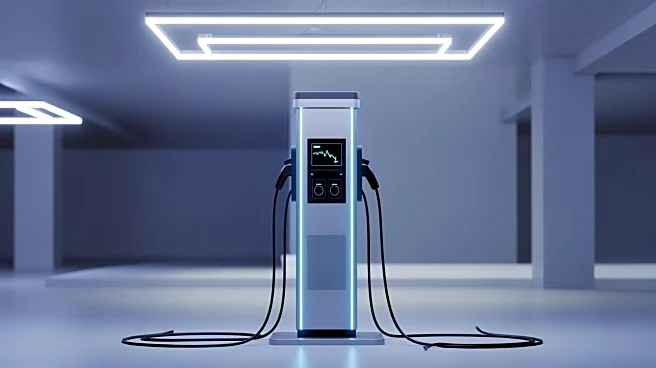What's Happening?
Tesla has reported a significant decline in profits for the third quarter of 2025, with a 37% drop despite a 12% increase in revenue. The electric vehicle manufacturer, led by Elon Musk, generated $28.1 billion in revenue but faced a substantial rise
in operating costs, which increased by 50%. This resulted in a profit of $1.4 billion, down from $2.2 billion in the same period last year. The company sold a record number of electric vehicles, delivering 497,099 units, largely driven by a rush of consumers purchasing before the expiration of a $7,500 federal EV tax credit on September 30. However, this sales boost is seen as a one-time event rather than a sustainable trend.
Why It's Important?
The decline in Tesla's profits highlights the challenges the company faces in maintaining its financial health amid rising costs and changing regulatory environments. The expiration of the federal EV tax credit, which significantly boosted sales, poses a risk to future sales figures. Additionally, Tesla's reliance on selling regulatory carbon credits, which contributed $417 million to its profits, is under threat as the U.S. government plans to end the carbon credit program. This could further impact Tesla's revenue streams. The company's financial performance is crucial not only for its stakeholders but also for the broader electric vehicle market, which looks to Tesla as a leader in innovation and market trends.
What's Next?
Tesla will need to navigate the post-tax credit landscape and find new ways to sustain its sales momentum. The potential end of the carbon credit program will require the company to explore alternative revenue sources or cost-cutting measures. Stakeholders will be closely watching how Tesla adapts to these changes and whether it can maintain its market position without the financial boosts from tax credits and regulatory credits. The company's strategy in response to these challenges will be critical in determining its future profitability and market influence.
Beyond the Headlines
Tesla's situation underscores the broader implications of government policies on the electric vehicle industry. The expiration of tax credits and regulatory changes can significantly impact consumer behavior and company strategies. Additionally, Elon Musk's public persona and political affiliations may influence consumer perceptions and brand loyalty, particularly among liberal-leaning customers. These factors highlight the complex interplay between business operations, government policy, and public perception in the evolving landscape of the electric vehicle market.















